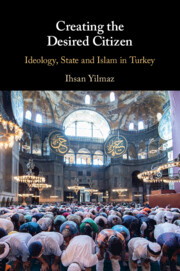Book contents
- Creating the Desired Citizen
- Creating the Desired Citizen
- Copyright page
- Dedication
- Contents
- Preface
- Acknowledgements
- Note on the Text
- List of Abbreviations
- 1 Anxious Nation and Its Ambivalent Westernism
- Part I Kemalism and Its Desired, Undesired, Tolerated Citizens
- 2 The Rise and Consolidation of the Kemalist Hegemony
- 3 Kemalism’s Desired Citizens
- 4 Kemalism’s Undesired Citizens
- 5 Creating Kemalism’s Tolerated Citizens via the Diyanet
- Part II Emergence of the Counter-Hegemony: Erdoğanism
- Part III Creating Erdoğanism’s Desired Citizens via Popular Culture and Education
- Part IV Erdoğanism’s Undesired Citizens
- Part V Creating Erdoğanism’s Tolerated Citizens via the Diyanet
- Book part
- Glossary
- References
- Index
5 - Creating Kemalism’s Tolerated Citizens via the Diyanet
from Part I - Kemalism and Its Desired, Undesired, Tolerated Citizens
Published online by Cambridge University Press: 25 May 2021
- Creating the Desired Citizen
- Creating the Desired Citizen
- Copyright page
- Dedication
- Contents
- Preface
- Acknowledgements
- Note on the Text
- List of Abbreviations
- 1 Anxious Nation and Its Ambivalent Westernism
- Part I Kemalism and Its Desired, Undesired, Tolerated Citizens
- 2 The Rise and Consolidation of the Kemalist Hegemony
- 3 Kemalism’s Desired Citizens
- 4 Kemalism’s Undesired Citizens
- 5 Creating Kemalism’s Tolerated Citizens via the Diyanet
- Part II Emergence of the Counter-Hegemony: Erdoğanism
- Part III Creating Erdoğanism’s Desired Citizens via Popular Culture and Education
- Part IV Erdoğanism’s Undesired Citizens
- Part V Creating Erdoğanism’s Tolerated Citizens via the Diyanet
- Book part
- Glossary
- References
- Index
Summary
This chapter analyses the Kemalism’s tolerated citizen creation project via the state’s powerful Presidency of Religious Affairs (Diyanet) that controls all mosques and employs all imams and preachers in Turkey. Kemalism wanted to keep Islam under its strict control to prevent its potential use for opposition. Thus, it made it illegal to have private mosques or to function as a non-state employer of imams. However, the Kemalist state also wanted to use Islam as a helping hand to build the nation based on the majority’s sectarian as well as ethnic identity. Thus, it worked to create a secularist and Turkish nationalism-friendly Islam –what I call ‘Diyanet Islam’. Before AKP came to power there were about 75,000 mosques in Turkey. The Diyanet used these mosques as adult education and indoctrination centres by politically instrumentalising weekly Friday sermons that are attended by about 60 per cent of the nation’s adult males. After elaborating on and defining Diyanet Islam, the chapter proceeds to discuss the Kemalist construction of a tolerated citizen category that I call ‘Homo Diyanetus’. Homo Diyanetus refers to a practising Sunni Muslim citizen of Turkey who follows the state manufactured Diyanet Islam, reveres the state and Atatürk, is Turkish nationalist, militarist and is definitely not a member or participant of any other religious group, brotherhood or movement.
Keywords
- Type
- Chapter
- Information
- Creating the Desired CitizenIdeology, State and Islam in Turkey, pp. 89 - 100Publisher: Cambridge University PressPrint publication year: 2021

